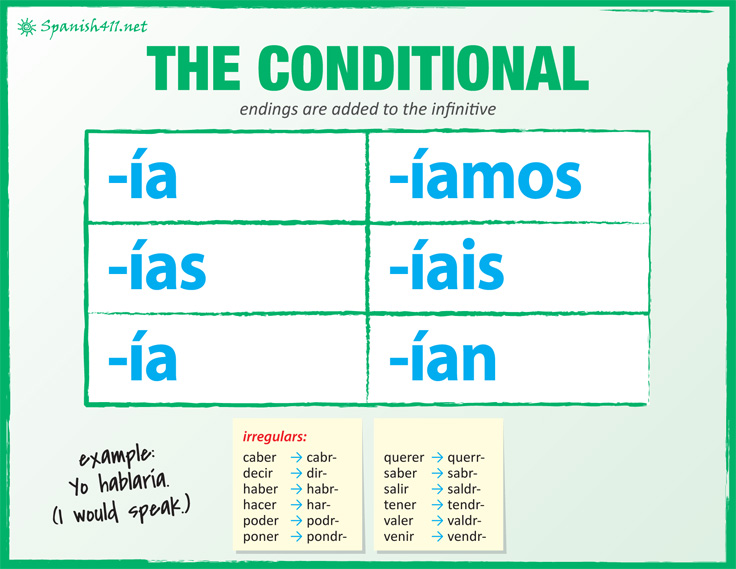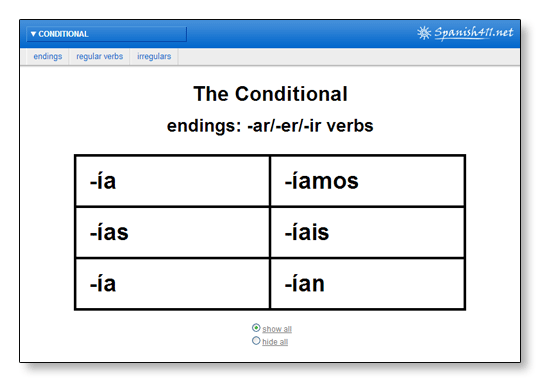|
|||||||||||||||||||||||||||||||||||||||||||||||||||||||||||||
 |
|||||||||||||||||||||||||||||||||||||||||||||||||||||||||||||
 |
|||||||||||||||||||||||||||||||||||||||||||||||||||||||||||||
The Conditional in Spanish
Note: Some consider the conditional to be a “mood.” Others consider it to be an indicative tense. As the name implies, the conditional is a verb conjugation used when some action is based upon some condition or somehow contingent on something else. This corresponds to the English use of the word “would.” For example, “What would you do?” “I would leave immediately.” The conditional conjugations closely parallel those of the future tense. Here’s what you need to know to conjugate and use the conditional. Regular Conditional VerbsSee also: The Future Tense As with the future tense, we don’t need to bother removing the “-ar,” “-er,” or “-ir” endings when conjugating in the conditional. We use the entire infinitive as our stem. And again, it doesn’t matter what kind of verb it is. Every verb uses these endings: “-ar” / “-er” / “-ir” endings:
Note: Because the yo and él/ella/Ud. forms are identical, it’s a good idea to include a subject pronoun if the subject isn’t clear. If those endings look familiar, they should. They’re exactly the same as the imperfect “-er” / “-ir” verb endings. How can different tenses have the same endings? Remember that here we’re adding them to the whole infinitive, not just the stem. Some examples: hablar:
comer:
vivir:
Some more examples: Nosotros trabajaríamos por tanto dinero. Tú entenderías más que yo. Yo conduciría el camión. Notice that the English translations include the word “would” or a contraction of it.  Let’s practice! Conjugate regular conditional verbs on ¡Practiquemos! Irregular Conditional VerbsNote: The verb haber is also irregular in the conditional. It becomes habría which means “there would be.” Note: The verb satisfacer (to satisfy) follows the pattern of hacer: satisfaría, satisfarías, etc. The bad news: there are irregular conditional verbs. The good news: all the irregularities are exactly the same as the irregular future verbs you already know. We just add the conditional ending to the same irregular stems:
Pay special attention to querer. The imperfect form of querer is quería. The conditional form is querría. Notice the difference? The only difference between saying “I wanted” and “I would want” is a rolled “r.” Some other examples: Él tendría que estudiar mucho. Yo vendría más temprano. No podrían correr tan rapidamente. Note: The verb bendecir (to bless) does not follow the pattern of decir: bendeciría, bendecirías, etc. Most verbs based on one of these irregular verbs will have a similar irregular conjugation. Take oponer and prevenir for example: Yo nunca la opondría. Los cambios prevendrían problemas financieros.  Let’s practice! Conjugate irregular conditional verbs on ¡Practiquemos! Using the ConditionalSee also: The Conditional Perfect When should you use the conditional? The primary reason is to discuss hypothetical situations that may or may not yet occur. These situations are contingent upon some other condition or situation. Sometimes the condition isn’t explicitly stated and we’re left to guess what it is: Yo terminaría mi tarea. Note: The conditional is also known as the “hypothetical future.” Sometimes the condition is alluded to with a simple prepositional phrase: Con más tiempo yo terminaría mi tarea. Sometimes the condition is a specific, present-tense circumstance introduced with pero: Yo terminaría mi tarea pero no tengo tiempo. And sometimes the condition itself is a hypothetical one introduced with si: Yo terminaría mi tarea si tuviera más tiempo. If you’re wondering about the tuviera, it’s an imperfect subjunctive conjugation that you probably haven’t learned yet. You can learn all about it by reading The Imperfect Subjunctive: How? and The Imperfect Subjunctive: When?. Other Uses of the ConditionalUse the conditional to make a conjecture or speculate about the past: Ella estudiariá ayer. Ellos caminarían más de cinco millas. Use the conditional to refer to the future from the point of view of the past. Consider these two sentences: Pienso que regresarán en una hora. Pensaba que regresarían en una hora. Both sentences speculate about the future. The first sentence is set in the present and includes a future tense verb. The second sentence is set in the past and includes a conditional verb. This concept also comes in handy when reporting what someone said: Ella dijo que traería las bebidas. And lastly, the conditional is used to “soften” requests or desires in order to sound more polite: ¿Podrías traerme un vaso de agua? Me gustaría ir al cine contigo. Podrías and gustaría are used here instead of puedes and gusta in order to sound a bit less demanding. Things to Look Out ForConsider this sentence: I would watch TV on Saturday mornings. This looks like a textbook example of a conditional conjugation since you see the word “would.” But “would” doesn’t always mean that we use the conditional. The problem here is that the “would” isn’t referring to any future hypothetical situation, but rather is indicating a habitual or repeated action in the past. In that case we need to use an imperfect conjugation, not a conditional one: Yo miraba TV los sábados por la mañana. |
|||||||||||||||||||||||||||||||||||||||||||||||||||||||||||||
 This work by Spanish411.net is licensed under a Creative Commons Attribution-NonCommercial-ShareAlike 4.0 International License. This work by Spanish411.net is licensed under a Creative Commons Attribution-NonCommercial-ShareAlike 4.0 International License. |



